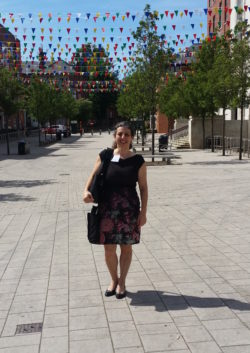IMC Memories: Eva Anagnostou-Laoutides
Eva Anagnostou-Laoutides (Macquarie University) first came to the IMC in 2013. We asked her what brought her back in 2017, and how she sees medieval studies changing.
I’m a classicist. My research covers a number of topics, including the reception of classical themes in an early medieval Christian context.
My first IMC was in 2013. Having done several presentations at my home institution, I talked with my colleague, Constant Mews. He invited me to try my ideas with an “interesting group of people” he had been meeting for many years at the International Medieval Congress. I’d never heard of it and asked where it was - at Leeds! I did a Masters in Latin Literature at Leeds many years ago, so it was a great opportunity to visit my alma mater while having a different focus. That was how I came to the IMC for the first time.

Eva Anagnostou-Laoutides at the 2017 IMC.
I was positively amazed there were so many people. I had no idea it was going to be so populous and so lively. All these people with their conference badges were going around town, and I thought: in my mind Leeds has this medieval feel, but I never thought of it as a medieval city. But with all these people around and all these discussions going on, it just clicked. It made perfect sense.
I next came to the IMC in 2017. I was lucky enough to get a research fellowship from the Australian Research Council, and I thought it was time to let people know that I have an interesting topic I want them to talk about. I wanted more dialogicians, more interlocutors drawn into my topic. That was the main impetus, and the fact that I knew the people I wanted to talk to about my topic were probably going to be there.
This time was even better. I’d arranged a number of meetings with publishers and I knew the surroundings a bit better. But I also got really good feedback. It’s so informal – there are many small groups of people that are highly specialised in what they are doing, and you can either go there and discuss one detail from your paper, or just join out of general interest. There’s so much to gain from these discussions. In my own session I got such interesting, useful feedback that I thought even if I didn’t attend another session, my purpose had been fulfilled there and then.
The conference runs over a number of days, and it gives you the flexibility of being more intensely involved and also having some fun because there are so many events taking place. You can have this nice alternation between very focused scholarly sessions, and those that attract more of a general interest.
When I was studying, the term ‘medieval’, and likewise ‘Byzantine’, had been associated with something negative: lack of intellectual impetus, lack of new ideas, everything organised by the church in an oppressive way, no freedom, and so on. We’ve come to the realisation this was a misapprehension, largely imposed on the discipline by earlier scholars rather than the texts themselves.
Now we’ve gone back to the texts and we’re trying to read them again from fresh perspectives, with new ideas, trying to appreciate all the struggle and the agony that comes through them around the existential issues that people always had, but which now needed to be renegotiated. We try to see the fruitful discussions about how early Christianity is going to accommodate pagan patterns, but also appropriate it, in the new cultural context that follows the Greco-Roman societies. So, how the Middle Ages prepares the way in many ways for the Renaissance.
I think it’s a very interesting time where medieval studies attracts new readers and opens up as a field, and makes an almost liberating movement towards other fields. We’re witnessing perhaps a renaissance of medieval studies. Where it’s going to go in the future I cannot predict, but I was struck by the enthusiasm of many of the younger people at the IMC and the new ideas they brought
to the table. Wherever it is medieval studies is moving in the next 10 or 20 years, it’s going to be an exciting place. I’ll be only too happy if I can to contribute to it a tiny bit.
Like all major conferences that provide a point of reference for people interested in a certain discipline, the IMC is crucial in reflecting debates in medieval studies, but also guiding them to a degree. It’s where people are getting together to agree or disagree. No matter how much technology has advanced, face-to-face interaction with other like-minded people, or people interested in a field as much as you are, is irreplaceable. From this point of view, the IMC plays a pivotal role.
The thing I appreciate most is the fiesta atmosphere I noticed when I first arrived, with the whole city participating. People making their mark, loud and clear. We are some weird people, interested in what happened many centuries ago, and we really want to get together and talk about it. No matter what spectacle we might present to the locals, I think it’s worthwhile.
